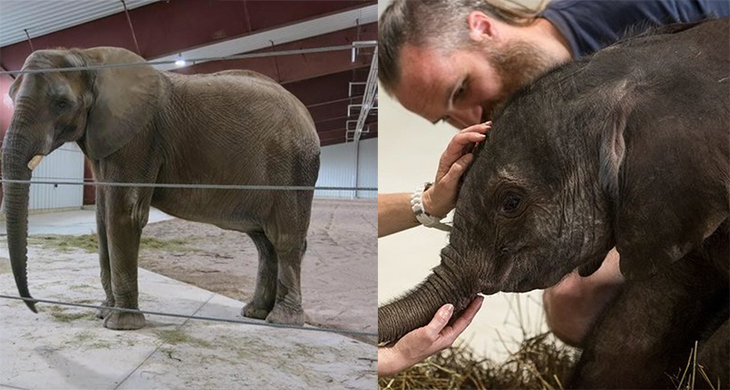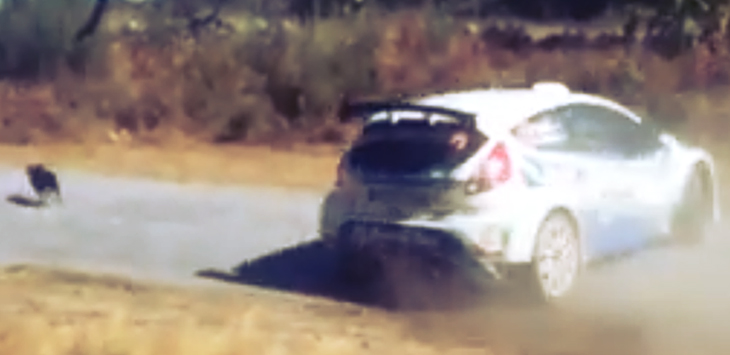By: Elizabeth Claire Alberts/The Dodo “They were under a lot of business pressure … they were willing to do anything.”
The elephant never should have been taken out of Africa, and she definitely shouldn’t have been forced to have another baby. That’s what animal welfare advocates say about Seeni, a 23-year-old elephant who tragically lost her family in Africa and was transported to Pennsylvania to take part in a captive breeding program.
Twenty-one years ago, when Seeni was just a baby, she lived in the wild with her family in the Kruger National Park region of South Africa. But her life drastically changed when the country killed Seeni’s family during an organized cull, which was done to protect vegetation, and to supposedly strengthen biodiversity in the area.

Seeni and another elephant at the International Conservation Center (ICC), where Seeni has lived since 2011 Facebook/Pittsburgh Zoo & PPG Aquarium
“That was a time in which wildlife folks said that elephants themselves were the problem instead of people, so they conducted these brutal culls,” Will Anderson, elephant campaign associate for In Defense of Animals, told The Dodo. “To this day, that cull is echoing in the life of Seeni.”
Park officials didn’t discriminate when they killed elephants during these culls — they killed the oldest matriarchs as well as the youngest calves. But somehow, Seeni survived. However, Dr. Toni Frohoff, a behavioral and wildlife biologist and elephant campaign director for In Defense of Animals, believes Seeni would be dealing with a great deal of trauma.

Seeni inside an enclosure at the ICCFacebook/Jeff Gagliardi
“There are distinct indications of elephants not only exhibiting trauma, but physiological and behavioral signs of post-traumatic stress after witnessing the death of family members, especially their mothers,” Frohoff told The Dodo.
But Seeni had no time to grieve. Shortly after the cull, she was moved to a privately-owned nature reserve in Botswana, where she and three other elephants were on public display and forced to give people rides. When Seeni got a little older, the trainer moved her to another camp with the goal of breeding her with a wild male elephant. It didn’t take long for Seeni to get pregnant.

Zoo workers with Seeni’s baby, who was born in May 2017Facebook/Pittsburgh Zoo & PPG Aquarium
“Seeni’s pregnancy is described as giving birth but failing to care for her newborn who reportedly died after three weeks,” Anderson said. “[Her] lack of maternal skills is not surprising given she was orphaned at 2 without a chance to learn elephant culture and skills.”
In 2011, Seeni’s life changed again. The International Conservation Center (ICC), which promotes itself as a “conservation, research, education, breeding, and training facility” and is part of the Pittsburgh Zoo, paid to ship Seeni and two other female elephants from Botswana to Pennsylvania.
One of the main goals of the ICC is to breed elephants but, for years, neither Seeni nor the other females got pregnant, despite the ICC’s multiple attempts.
But in 2015, the ICC workers introduced a bull named Jackson, hoping he’d get at least one of them got pregnant. Seeni conceived soon after.
“Seeni’s pregnancy is exciting news,” Dr. Barbara Baker, president and CEO of Pittsburgh Zoo, told WTAE in 2017. “The infusion of new genetics is important to secure a future for African elephants in North America.”

A worker attending to Seeni’s babyFacebook/Pittsburgh Zoo & PPG Aquarium
Yet Frohoff believes the zoo’s decision to impregnate Seeni was irresponsible and selfish.
“The fact that she [Seeni] was known to have exhibited neglect to a previous calf indicates … apparent behavior that is indicative of an underlying trauma, as well as raising concerns about how appropriate it is for her to be used for reproduction,” Frohoff told The Dodo. “In fact, some professionals would argue that it was reckless and selfish of the facilities to impregnate Seeni.”
So why did they do it? Anderson believes it had a lot to do with money.
Facebook/Pittsburgh Zoo & PPG Aquarium
“The ICC is a very pricey institution … for which there have been millions upon millions of dollars spent to fulfill their promise that they will have a center that breeds more elephants,” Anderson said. “Yet this [Seeni’s baby] is the first one they’ve had since the center was opened in 2006, so they were under a lot of business pressure to make good on their word, and they were willing to do anything.”
On May 31, 2017, Seeni prematurely gave birth to a female baby in the middle of the night. No one was around to witness it or help her.
“When the staff came in … they found her [Seeni] exhausted and trying to get her baby to stand up,” Anderson said. “So that’s when the staff intervened.”
According to media reports, Seeni wasn’t producing milk for her calf, so the ICC staff decided to remove the baby from her mother and take the baby to the Pittsburgh Zoo, where human caretakers would hand-rear her and feed her milk with a bottle.
Not long after being separated from her mom, the baby (who remains unnamed) became critically ill. She stopped feeding and lost 15 pounds.
Last week, the baby elephant even underwent surgery to get a feeding tube inserted in her esophagus. While the baby elephant is said to be recovering well, Frohoff worries about the long-term effects of removing the baby from her mother.
“If this baby survives, she will not have the maternal skills needed either to successfully reproduce,” Frohoff said. “So what they are doing is breeding successive generations of psychologically impoverished elephants, which in the opinion of many conservation biologists is irresponsible. She [the baby] has already suffered the absence of her mother … but she’s also suffering both psychologically and mentally from these invasive medical procedures.”
After being moved to the Pittsburgh Zoo, the weak baby elephant was almost immediately placed on display for the public, which Frohoff believes was an effort to bring in more visitors and money to the zoo. “It’s very profitable for them,” she said.
While Frohoff is particularly concerned for the health and well-being of Seeni and her baby, she points toward a larger issue at hand — the zoo’s treatment of elephants as objects, rather than as sentient beings.
“The old paradigm that appears to be being used is that elephants are mere objects, while ignoring all of the scientific evidence to the contrary that they are sentient individuals and complex social cultures that then create what is an elephant,” Frohoff said. “They [zoos] are not considering that what makes an elephant an elephant is a rich and complex psychological and cultural way of being in the world, and if you take away their cultural identity [and family] … you are creating, through that process, an extremely unnatural elephant that cannot be expected to reproduce successfully.”
Pittsburgh Zoo could not be immediately reached for comment.
The best solution for Seeni and her baby would be to send them both to a certified elephant sanctuary, Frohoff explained, although she added that the baby would first need to be stabilized, and the right time for such a move would need to be properly assessed.
“It wouldn’t be surprising if Seeni and the baby would bond more easily with Seeni in a healthier environment where she wasn’t being chronically and institutionally traumatized as she is at Pittsburgh Zoo,” Frohoff said.
Another way to help elephants like Seeni and her baby is to support organizations that help keep them in the wild, Anderson said.
“Take the money you would spend going to a zoo, and donate it to an African organization that is helping to protect wild elephants,” Anderson said. “It’s really maddening to see zoos suck up so much money from the public and spend so much money on captivity, when all of that should be going to elephants in Africa and Asia and the people who are protecting them there.”











